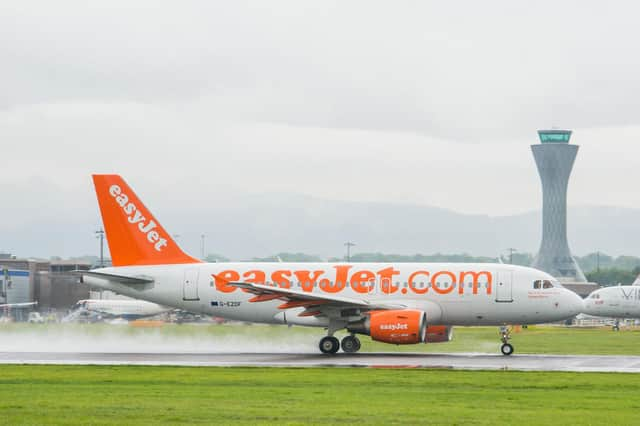EasyJet plunges to historic loss of £1.3bn amid pandemic: reaction


The carrier’s pre-tax loss for the year to September 30 – the first in its 25-year history – comes after passenger numbers halved to 48.1 million as governments’ handling of the coronavirus crisis crippled the aviation industry.
The group warned that it expects to fly no more than around 20 per cent of planned services in the first quarter of its year to next September as a second wave of the pandemic dents demand. EasyJet’s losses compare with profits of £430 million the previous year.
Advertisement
Hide AdAdvertisement
Hide AdOn an underlying basis, it reported pre-tax losses of £835m against profits of £427m the previous year, which was in line with expectations.
Chief executive Johan Lundgren said the group had responded “robustly and decisively” to the crisis and cheered “welcome news” on a possible Covid-19 vaccine.
He said: “While we expect to fly no more than 20 per cent of planned capacity for the first quarter of 2021, maintaining our disciplined approach to cash generative flying over the winter, we retain the flexibility to rapidly ramp up when demand returns.
“We know our customers want to fly with us and underlying demand is strong.”
He added the Luton-based airline, which operates a string of routes out of Scotland, expected to “bounce back strongly”.
Passenger numbers in the year ending September 30 fell to 48.1 million, compared with 96.1 million during the previous 12 months.
The airline said it has the flexibility to “rapidly ramp up capacity when we see demand return”. It saw a ten-fold increase in bookings for Canary Islands flights in the five days after the UK lifted quarantine restrictions on people returning from the Spanish islands on October 25.
Freetrade’s senior analyst Dane Lane said: “Jetting away has been anything but easy this year and these results show just how much the virus has weighed on the industry.
Advertisement
Hide AdAdvertisement
Hide Ad“It’s tough to look at any numbers this morning without having that one line on a ‘possible vaccine’ firmly in mind. Easyjet’s immediate future is about shoring up the balance sheet with the money they have but longer term, a vaccine is the only thing that matters – and it’s out of their control.”
Dan Thomas, senior analyst at Third Bridge, noted: “Potential vaccines don’t change the near term demand picture for carriers like EasyJet.
“For the time being, this winter looks bleak for EasyJet as national lockdowns persist across the continent. This is reflected in carriers’ capacity planning, with EasyJet intending to fly around only 20 per cent of planned capacity for fiscal Q1 2021.
“EasyJet continues to use the sale and leaseback of unencumbered aircraft as a source of liquidity. The carrier announced the sale of 11 A320s last week with cash proceeds of £131m. The low-cost airline now retains 141 fully owned and unencumbered aircraft, roughly 40 per cent of its fleet.
“When travel corridors do begin to reopen, profitability is likely to remain depressed as multiple carriers look to redeploy across a smaller number of potential routes and discount fares are offered.”
A message from the Editor:
Thank you for reading this article. We’re more reliant on your support than ever as the shift in consumer habits brought about by coronavirus impacts our advertisers. If you haven’t already, please consider supporting our trusted, fact-checked journalism by taking out a digital subscription: www.scotsman.com/subscriptions
Comments
Want to join the conversation? Please or to comment on this article.